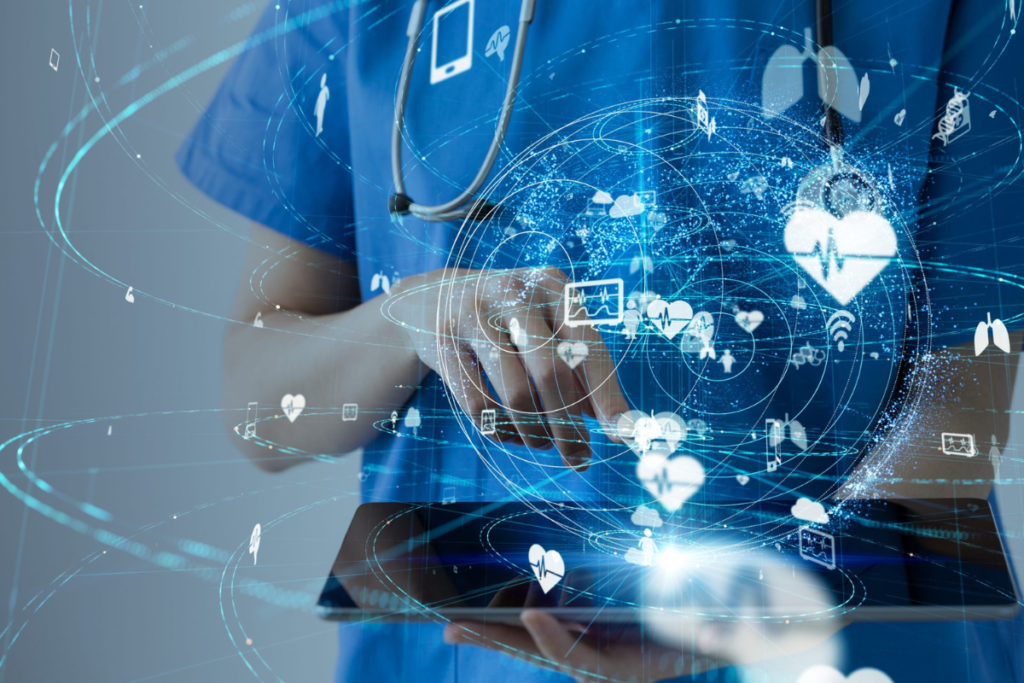
The healthcare industry is rapidly advancing with the integration of emerging technologies such as Artificial Intelligence (AI), Natural Language Processing (NLP), Augmented Reality (AR), Virtual Reality (VR), and the Internet of Medical Things (IoMT). These technologies have transformed the way healthcare services are delivered and have brought in a new era of change in the industry. In this article, we will discuss how these technologies are impacting the healthcare industry and changing the way healthcare services are delivered.
Integrating Artificial Intelligence And Natural Language Processing For Seamless Experience
AI and NLP have made a significant impact on the healthcare industry by enabling the analysis of enormous amounts of unstructured data. These technologies have been used to enhance clinical data by mapping data elements in unstructured text to structured fields in Electronic Health Records. For example, Google’s DeepMind created an A.I. for breast cancer analysis that outscored all human radiologists in detecting breast cancer. Also, Avive Solutions developed Avive AED that utilizes AI to improve survival rates for cardiac arrest.
NLP-powered patient feedback management solutions have helped healthcare facilities secure and ensure patient loyalty. AI and NLP are the driving force for better clinical decision support and patient health outcomes.
The Power of Augmented Reality & Virtual Reality in Healthcare
VR and AR solutions have had a tremendous impact on healthcare technology. VR can present itself as an appealing possibility for assisting patients in relaxing and suffering less in stressful scenarios. A recent Harvard Business Review study showed that VR-trained surgeons exhibited a 230 percent increase in overall performance as compared to their traditionally trained peers. Also, AccuVein has come up with a real-world problem-solving technique using augmented reality. The use of AR here makes it much easier for clinicians to locate veins when administering injections by sensing the heat signature of the blood flow and outlining it on the patient’s arm.
Implementing such emerging technology allows healthcare practitioners unfettered access to activities that are not currently available, as well as allowing individuals to regain their overall health and mental well-being.
Role Of IoMT And Wearables In Healthcare
The Internet of Medical Things (IoMT) is rethinking the interplay between people and devices in the delivery of healthcare solutions. Portable point-of-care devices are being used to run regular tests and share the results remotely with a doctor. Digital blood pressure cuffs (smart pills equipped with edible sensors) are being used to deliver a continuous stream of blood pressure and pulse data to a doctor that will alert their patients if they are taking their medications as prescribed.
The development of wearable apps in healthcare has made health monitoring easier than in the past. Wearables such as watches, bands, and other accessories have made it easier to track health metrics. DARPA has also been working on various wearable computers that have helped patients with epilepsy and strokes by stimulating or deactivating portions of the brain.
Thus, wide adoption of IoMT devices would be the easiest to predict among the health tech trends soon.
Made Easy By Personalized Mobile Apps And Chatbots
Mobile apps have transformed the way healthcare services are delivered. Numerous patient scenarios can be delivered shortly by a potent native mobile application. A customized mobile app with integrated EHR/EMR systems could become the single most essential point of interaction between healthcare practitioners and patients.
Chatbots have also emerged as a crucial tool in the healthcare industry. They can provide medical advice, monitor patients’ health conditions, and even detect early symptoms of disease. Many health organizations have already started adopting chatbots as an efficient tool for delivering healthcare services.
Takeaway
The rapid emergence of advanced technologies has undoubtedly disrupted the traditional healthcare industry, and the impact has been profound. These innovative technologies have introduced new possibilities and opportunities that have transformed the way healthcare services are delivered, elevating the quality and efficiency of care to unprecedented heights.
By embracing these technologies, healthcare organizations have improved their ability to diagnose, monitor, and treat various medical conditions with greater accuracy and precision, leading to better patient outcomes. The incorporation of emerging technologies such as Artificial Intelligence (AI), Blockchain, and the Internet of Things (IoT) has provided the healthcare sector with a wealth of opportunities to optimize patient care delivery.
Moreover, as these technologies continue to evolve and mature, it is expected that healthcare organizations will increasingly adopt them to enhance their capacity to provide high-quality care. The transformative impact of these technologies on healthcare will continue to reshape the industry, improving outcomes, reducing costs, and providing new opportunities for healthcare providers, patients, and their families.
In summary, the growing adoption of emerging technologies in healthcare represents a significant step forward in the quest to improve patient care delivery. As the healthcare industry evolves, these technologies will continue to play a critical role in shaping the future of healthcare, ultimately leading to better health outcomes for individuals and communities.










